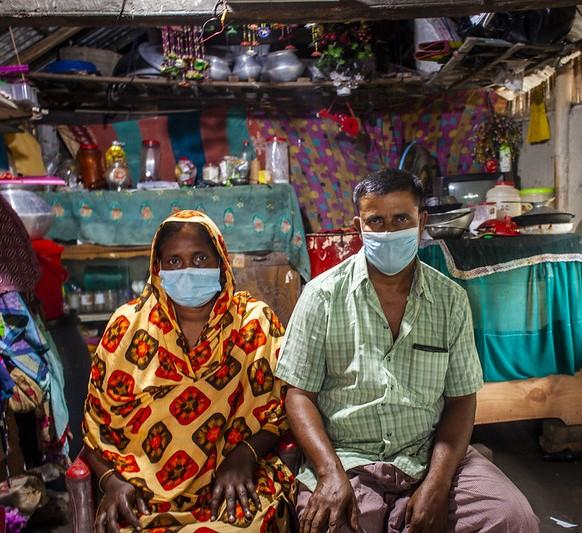The pandemic total today topped 29 million cases today, and over the weekend, amid warnings of 2 tough months ahead for Europe and a new harsh assessment on the world's response to COVID-19 from an expert group that monitors preparedness.
In other developments, the pandemic saw a record global daily high in cases yesterday, and AstraZeneca over the weekend announced that a United Kingdom trial of a COVID-19 vaccine that it is developing with Oxford University has resumed.
The global total today reached 29,127,436 cases, and 925,749 people have died from their infections, according to the Johns Hopkins online dashboard.
Surges in India, Israel, Europe
The World Health Organization (WHO) online dashboard yesterday reflected a record daily high of 307,930, the most since Sep 6. Over the past few weeks, India has led with world with the highest daily case totals, today reporting more than 92,000 cases, as it approaches 5 million cases.
India's parliament today met for the first time in 6 months, with several precautions, including staggered assembly hours, mask use, and glass partitions, Reuters reported.
In another development, India's health minister said today that the government is considering an emergency use authorization (EUA) for COVID-19 vaccines. Advanced trials are under way in India on its own vaccine and collaborations with other groups. Health minister Harsh Vardhan said no safety corners would be cut, but the EUA could streamline phase 3 trials, with results expected in the first quarter of 2021.
Elsewhere, Israel's prime minister announced yesterday that the whole country will reenter a lockdown due to steeply rising cases. The measure, which starts on Sep 18 and will last 3 weeks. Israel is thought to be the first to order a new lockdown for the entire country.
Meanwhile, Europe—currently reporting steep rises in countries such as France and Spain—could experience a rise in COVID-19 deaths in October and November, Hans Kluge, MD, MPH, director of the WHO's European regional office said today.
In other European developments, the Czech Republic yesterday reported a daily record high cases for the third straight day, Romania reopened schools today amid rising cases, and the United Kingdom reported a 185,000 test backlog at labs due to an increased number of asymptomatic people being tested.
AstraZeneca restarts UK vaccine trial
In vaccine developments, AstraZeneca 2 days ago announced that a trial of a COVID-19 vaccine it is developing with Oxford University has resumed following an investigation by the Medicines Health Regulatory Authority. On September 9 the company said it voluntarily paused phase 3 trials of the COVID-19 vaccine so that an independent committee could investigate an unexplained illness in a UK participant.
Stat last week reported, based on information from an AstraZeneca call with investors, that the illness involved a UK woman who had symptoms consistent with transverse myelitis. The company also said the trial had been paused once before in July to look into neurologic symptoms in a participant, later found to be related to multiple sclerosis and not the vaccine.
In its new statement, AstraZeneca said it could not disclose further medical information about the case, but all trial participants and investigators will be updated with the latest information.
The phase 3 trial of the vaccine (AZD1222), which uses a nonreplicating chimpanzee adenovirus to deliver a SARS-CoV-2 spike protein, is also underway in four other countries, including the United States. And today Reuters reported that the trial in the United States is still on pause pending an investigation by the Food and Drug Administration.
Brazil has restarted its part of the trial, but the status isn't clear for the trials in South Africa and India.
Report: Response a 'collective failure'
In its second annual report, an independent board established by the WHO and the World Bank to track global outbreak and emergency preparedness had a harsh assessment of how the world has responded to the COVID-19 threat, calling it a "collective failure" to prepare for such an event.
The Global Preparedness Monitoring Board said the virus has taken advantage of world in disorder, which has brought broad catastrophic consequences and irreparable harm. "It would take 500 years to spend on preparedness as the world is currently losing due to COVID-19," the group said in a statement. "The world cannot afford this cycle of panic and neglect."
Leaders in many countries struggled to take early action, based on science, evidence, and best practices, the report said, adding that the lack of accountability has triggered a profound and deepening lack of trust that is an obstacle to response actions.
The group published its first report just 3 months before SARS-CoV-2 was first detected in China, which called out a cycle of panic and neglect when it comes to pandemics and recommended seven urgent actions to boost global preparedness.
In a related development, the Organization for Economic Cooperation and Development said today in an update on gross domestic product growth in G20 countries for the second quarter of 2020 that the pandemic's economic impact so far this year is six times bigger than the 2009 financial crisis.














